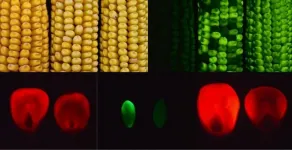New research shows benefits of deworming expectant mothers to their infants
With more than a quarter of the world infected with the soil-transmitted helminth (STH), one method is showing particular promise when it comes to reducing infant mortality and low birth weight caused by STH infection
2021-05-03
(Press-News.org) More than 25% of the world's population (greater than 1.5 billion people) face the burden of soil-transmitted helminth (STH) infections, a species of intestinal parasite whose eggs develop in the soil before finding a new host. The main cause of this high infection rate is lack of access to adequate sanitation facilities (toilets) and the consequent contamination of the environment with human feaces. While universal access to adequate sanitation is one of the sustainable development goals, parasite burdens are still causing harm. Fortunately, deworming medicines are highly effective and safe. Researchers from Syracuse University, the World Health Organization, and SUNY Upstate measured the impact of deworming medicine during pregnancy on the subsequent risk of neonatal mortality and low birthweight. The study has been conducted on 95 Demographic Health Survey data collected on more than 800 000 births and the results are published on the current issue of PLoS Neglected Tropical Diseases
When women receive deworming medicine during pregnancy, we find two specific benefits for the baby: first, the risk of neonatal mortality (a baby's death within the first 4 weeks of life) decreases by an estimated 14%; second, the odds of low birthweight are an estimated 11% lower in countries with lower transmission of soil-transmitted helminths. These results vary somewhat by transmission rate across different countries.
Given the low cost of deworming medicine and fundamental health advantages, these findings call for an increased global effort toward widescale distribution of deworming medicine for pregnant women. Global effort toward reducing STH infections is affordable, and the benefits far outweigh the program costs.
A recent study has found that mothers receiving deworming treatment during pregnancy reduce by 14% the risk of their child dying within the first four weeks after birth. Another benefit is that treating pregnant women with anthelminthic medicines can avoid low birthweight.
The study, conducted on 95 Demographic Health Survey datasets and collected on more than 800 000 births, utilized birth histories to measure the impact of routine deworming medicine during antenatal care on subsequent neonatal mortality and low birthweight for births between 1998 and 2018 in 56 lower income countries.
"Pregnant women who received deworming medication were associated with a 14% reduction in risk for neonatal mortality, with no difference between high and low transmission countries," said Bhavneet Walia of the Department of Public Health, Syracuse University, New York, USA. "We also found that in countries with low transmission of soil-transmitted helminths, deworming treatment decreased the odds of low birthweight by 11%, although these somewhat varied in relation to transmission rates across different countries."
Routine deworming during antenatal care decreases risk of neonatal mortality and low birthweight: a retrospective cohort of survey data' (to hyperlink) authored by Syracuse University, the World Health Organization (WHO) and SUNY Upstate is published in the journal, PLoS Neglected Tropical Diseases.
The researchers matched births on the probability of receiving deworming during pregnancy. They then modelled birth outcomes with the matched group to estimate the effect of deworming during antenatal care after accounting for various risk factors. They also tested for effect modification of soil-transmitted helminth prevalence on the impact of deworming during antenatal care.
"Intestinal worms impact the health of women and girls of reproductive age and this study supports the fact that treating pregnant women can be beneficial," said Dr Antonio Montresor, Medical Officer, WHO Department of Control of Neglected Tropical Diseases. "WHO has long recommended the deworming women of reproductive age after their first trimester of pregnancy and in areas where the prevalence of worm infections is 20% or higher."
Soil-transmitted helminths2 are transmitted by ingesting microscopic eggs that are passed in the faeces of infected people and disperse in the environment. Adult worms live in the intestines where they produce thousands of eggs each day. In areas that lack adequate sanitation, these eggs contaminate the soil.
More than 1.5 billion people, or 24% of the world's population, are infected with soil-transmitted helminths. Infections are widely distributed in tropical and subtropical areas, with the greatest numbers occurring in sub-Saharan Africa, the Americas, China and East Asia.
Approximately 688 million girls and adult women of reproductive age live in areas which are endemic for intestinal worms, in more than 100 countries. The greatest number is found in sub-Saharan Africa, the Americas and Asia where reinfection is frequent in areas of high transmission.
WHO coordinates shipment of donated medicines to countries requesting them. They are then distributed freely by national disease control programs during mass treatment campaigns.
Periodic deworming should be available to children and to all pregnant women in endemic countries.
Deworming is not the only answer, however. A permanent solution can only be obtained by a substantial improvement in access to sanitation - a process that is normally slow and expensive.
INFORMATION:
ELSE PRESS RELEASES FROM THIS DATE:
2021-05-03
A year into the COVID-19 pandemic, mass vaccinations have begun to raise the tantalizing prospect of herd immunity that eventually curtails or halts the spread of SARS-CoV-2. But what if herd immunity is never fully achieved - or if the mutating virus gives rise to hyper-virulent variants that diminish the benefits of vaccination?
Those questions underscore the need for effective treatments for people who continue to fall ill with the coronavirus. While a few existing drugs show some benefit, there's a pressing need to find new therapeutics.
Led by The University of New Mexico's Tudor Oprea, MD, PhD, scientists ...
2021-05-03
An abnormal build up of carbohydrates -- sugars and starches -- in the kernels and leaves of a mutant line of corn can be traced to one misregulated gene, and that discovery offers clues about how the plant deals with stress.
That is the conclusion of Penn State researchers whose previous study discovered the Maize ufo1 gene responsible for creating the mutant corn line. They now are assessing its effects and potential for inclusion in breeding new lines of corn better able to thrive in a warming world. The finding of higher sugar levels in plant tissues in their latest study is just ...
2021-05-03
May 3, 2021
Using social values for profit cheapens them, a new study cautions.
Toronto - Businesses sometimes align themselves with important values such as a clean environment, feminism, or racial justice, thinking it's a win-win: the value gets boosted along with the company's bottom line.
But be careful, warns new research from the University of Toronto's Rotman School of Management.
Using these values primarily for self-interested purposes such as profit or reputation can ultimately undermine their special status and erode people's commitment to them.
"It sets a different norm for appropriate use of the value," says research author Rachel Ruttan, an assistant professor of organizational behaviour and human resources at the Rotman School, who ...
2021-05-03
When it comes to batteries, lithium-ion are the best we have as far as energy density and convenience.
For now.
The Washington University in St. Louis lab of Peng Bai, assistant professor in the Department of Energy, Environmental & Chemical Engineering in the McKelvey School of Engineering, has developed a stable sodium ion battery that is highly efficient, will be less expensive to make and is significantly smaller than a traditional lithium ion battery due to the elimination of a once-necessary feature.
"We've found that the minimal is maximum," ...
2021-05-03
Hydraulic fracturing to extract trapped fossil fuels can trigger earthquakes. Most are so small or far from homes and infrastructure that they may go unnoticed; others can rattle windows, sway light fixtures and jolt people from sleep; some have damaged buildings.
Stanford University geophysicists have simulated and mapped the risk of noticeable shaking and possible building damage from earthquakes caused by hydraulic fracturing at all potential fracking sites across the Eagle Ford shale formation in Texas, which has hosted some of the largest fracking-triggered earthquakes in the United States.
Published ...
2021-05-03
ATLANTA--An influenza vaccine that is made of nanoparticles and administered through the nose enhances the body's immune response to influenza virus infection and offers broad protection against different viral strains, according to researchers in the Institute for Biomedical Sciences at Georgia State University.
Recurring seasonal flu epidemics and potential pandemics are among the most severe threats to public health. Current seasonal influenza vaccines induce strain-specific immunity and are less effective against mismatched strains. Broadly protective influenza vaccines are urgently needed.
Intranasal vaccines are a promising strategy for combatting ...
2021-05-03
BOSTON -- For the first time, researchers have shown how Mullerian inhibiting substance (MIS), also known as anti-Mullerian hormone, a key reproductive hormone, suppresses follicle development and prevents ovulation in females. "Understanding the mechanism of follicle development by MIS opens the door to creating novel approaches to contraception, preserving the eggs of young girls undergoing chemotherapy, enhancing the success of fertility treatment, and potentially delaying menopause," says David Pépin, PhD, an associate molecular biologist in the Department of Surgery at Massachusetts General Hospital (MGH) and senior author ...
2021-05-03
Even under the most optimistic scenarios, most of the coral reef ecosystems on our planet - whether in Australia, the Maldives or the Caribbean - will have disappeared or be in very bad shape by the end of this century. That's because global warming is pushing ocean temperatures above the limit that single-cell algae, which are corals' main allies, can withstand. These algae live inside coral tissue for protection and, in exchange, provide corals with essential nutrients produced through photosynthesis. Because the algae contain a variety of pigments and therefore give coral reefs their famous colors, if they are lost the corals turn white, which is known as coral bleaching. But in spite of the real threat caused by global warming, corals in the ...
2021-05-03
Abu Dhabi, UAE, May 3, 2021: Researchers from NYU Abu Dhabi's Center for Genomics and Systems Biology have successfully sequenced the genome of previously extinct date palm varieties that lived more than 2,000 years ago. They did so using date palm seeds that were recovered from archaeological sites in the southern Levant region and radiocarbon-dated from the 4th century BCE to the 2nd century CE. The seeds were germinated to yield viable, new plants. The researchers conducted whole genome sequencing of these germinated ancient samples and used this genome data to examine the genetics of these previously extinct Judean date palms. This study marks the first time researchers have sequenced the genomes of plants ...
2021-05-03
First-of-its-kind model replicates human alveolar lung tissue
Allows researchers to study effects of COVID-19 on cell growth and development
Provides insight as to how various drugs impact viral spread
Globally, lung failure is one of the leading causes of death. Many conditions can affect and damage the lungs, including asthma, chronic obstructive pulmonary disease, influenza, pneumonia, and, most recently, COVID-19. To better understand respiratory diseases and develop new drugs faster, investigators from Brigham and Women's Hospital designed a ...
LAST 30 PRESS RELEASES:
[Press-News.org] New research shows benefits of deworming expectant mothers to their infants
With more than a quarter of the world infected with the soil-transmitted helminth (STH), one method is showing particular promise when it comes to reducing infant mortality and low birth weight caused by STH infection




